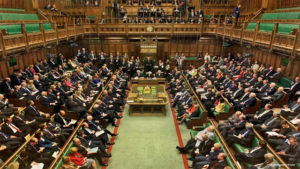 The United Kingdom Parliament yesterday approved new measures to confront money-laundering via the Sanctions and Anti-Money Laundering Bill.
The United Kingdom Parliament yesterday approved new measures to confront money-laundering via the Sanctions and Anti-Money Laundering Bill.
But the measures will affect the financial services of the Overseas Countries and Territories, including CARICOM Associate Members – Anguilla, Bermuda, British Virgin Islands (BVI), Cayman Islands and Turks and Caicos Islands – and the Organization of Eastern Caribbean States (OECS) has called on the UK Parliament to reject the changes to the legislation.
Under the amendment, the UK Government would be required to take steps for British Overseas Territories to establish publicly accessible registers of the beneficial ownership of companies.
The OECS issued a statement in which it said it strongly opposed certain provisions of the Bill, and spoke up on behalf of the BVI, one of the members of the sub-regional grouping.
“While we recognize and respect the sovereign right of the UK to determine its national legislation, our concern centres on those provisions which are discriminatory to the BVI and which contravene the constitutional arrangement between the BVI and the UK by which financial services are formally entrusted to the democratically elected BVI Government when the new Constitution was agreed in 2007,” it said.
“The passage of these provisions effectively disenfranchises the BVI people and will undermine the constitutional relationship between the BVI and the UK.”
The OECS noted that the requirement for the registers of the beneficial ownership of companies would not be applied to Britain’s crown dependencies, Jersey, Guernsey and the Isle of Man, “thus appearing to specifically target the Caribbean at a time when several of our member states are still reeling from the devastation caused by Hurricanes Irma and Maria”.
“The issue of public registers is a matter for international financial regulation, in this case led by the Financial Action Task Force (FATF). It does not require a public register but that beneficial ownership information is accessible by law enforcement and/or other competent authorities and is verified. The BVI not only meets these requirements but has enhanced its system through the introduction of an innovative digital platform by which such information is immediately and directly accessible to BVI competent authorities.
“Further, BVI has firmly stated that if such a requirement is adopted as an international standard then it will comply. In contrast the UK Register while public, is actually not verifiable, and thereby arguably does not technically meet FATF requirements,” the OECS statement added.
OECS Chairman, St Lucia’s Prime Minister Allen Chastanet, lamented the ongoing frustration of member states in having to continually battle the unilateral shifting of goal posts on the financial services front.
“We have all indicated our commitment to meeting (and in some cases exceeding) international standards of financial accountability and in return expect that these standards are non-discriminatory and take account of the special vulnerable circumstances of small island developing states,” he said.
